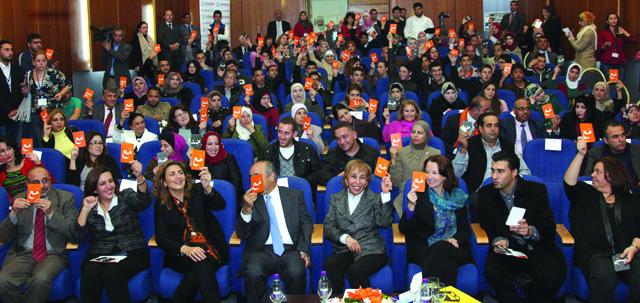You are here
USAID, partners discuss gender mainstreaming project
By Ahmad Amaireh - Mar 17,2021 - Last updated at Mar 17,2021
AMMAN — The highlights of a USAID-funded programme that seeks to mainstream gender within society took centre stage at a recent event, reviewing the project’s activities in Jordan over the last eight years in collaboration with the government and civil society.
On March 10, the Gender Programme funded by USAID and implemented by IREX “Takamol”, held an event titled “Mainstreaming Gender in the Jordanian Context - USAID Takamol Learning Journey.”
The USAID Takamol programme implemented by IREX, a global development and education organisation, is a programme that seeks to promote gender equality and women’s empowerment in Jordan, according to IREX.
The work of the programme focuses on implementing gender mainstreaming projects and activities in four main fields: Political, labour, justice and education.
Speaking during the event, Hala Murad, director of Dibeen Association for Environmental Development elaborated on how the USAID Takamol grant helped the organisation gain “a deeper understanding” of gender and develop gender mainstreaming capacity, as well as incorporate gender into their environmental policies and work with the government and local communities.
She stressed the importance of having women in positions of decision-making, as well as the effect that environmental issues have on women in particular.
Janet Tayeb, director of the Economic and Social Research Directorate at Social Security Corporation and head of the Gender Audit team, discussed how the gender audit conducted and trainings implemented through the grant obtained from USAID Takamol helped the corporation’s staff build capacities that will lead to better service despite not having an institutionalised gender strategy within the corporation.
Salma Nims, secretary general of the Jordanian National Commission for Women, also joined the event via Zoom to highlight USAID Takamol’s work in collaborating with civil society organisations and the government, as well as incorporating gender into their strategies.
Haya Awaysheh, Prime Ministry’s Inter-Ministerial Committee Secretary, spoke about the importance of the inter-ministerial committee and the projects it worked on with USAID Takamol, especially the Gender Data Dashboard.
Awaysheh emphasized the importance of data in achieving meaningful change in every area and clarified how the dashboard’s primary goal is to assist government gender focal points in improving their research processes and producing more gender-sensitive reports.
Samah Marmash, CEO of the Arab Women Legal Network, led the discussion on the legal aspect of the programme’s projects with the network through offering training on gender and gender-based violence to the Family Protection Department’s staff as well as judges from the Judicial Council.
Kristin Lord, CEO of IREX spoke on how change can be slow and difficult, but perseverance is needed since gender equality is a critically important area having many benefits for all of society. Lord also urged all organisations to continue to be “learning organisations” and promote gender equality and social inclusion.
USAID Takamol launched two legacy documents, the first which is the Gender Resource Manual. The manual serves as a guide for self-learning and instructing trainings on gender-related terms and concepts, the event heard.
The second document is Gender Audit Manual. The aim of this guide is to introduce government employees to the benefits and phases of participatory gender audits. It will provide public sector employees with basic gender mainstreaming knowledge, a step-by-step guide to participatory gender audits, and models to assess institutional readiness to conduct participatory gender audits in their own workplaces.
Related Articles
AMMAN — The public sector is forming a network of gender focal points that will work together to mainstream gender and advance women’s right
Gender-based violence leads to widespread social violence, which negatively affects the security and safety of the community, HRH Princess Basma said Tuesday.
AMMAN — Private and public institutions, civil society organisations and activists made commitments to empower women in the workplace at the













